Key takeaways:
- Palestinian literature intricately connects history, identity, and resistance, inviting readers to empathize with overlooked lives.
- Key themes include loss, displacement, resistance, and identity, exploring profound human experiences amid conflict.
- Major authors like Mahmoud Darwish, Ghassan Kanafani, and Susan Abulhawa profoundly impact understanding of Palestinian narratives and their emotional depth.
- The Palestinian Conference highlighted storytelling as a powerful tool for healing and preserving cultural heritage, emphasizing the need for marginalized voices to be uplifted.
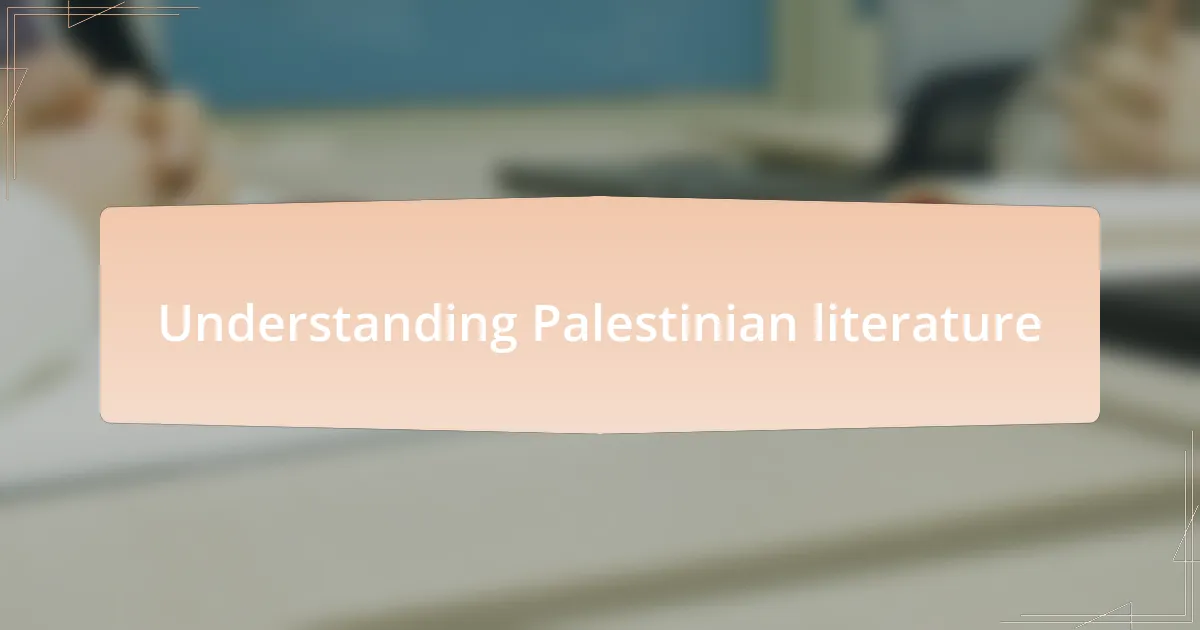
Understanding Palestinian literature
Palestinian literature is an intricate tapestry that weaves together history, identity, and resistance. I remember reading works by Mahmoud Darwish and feeling a profound connection to the landscapes and experiences he depicted. His poetry resonates deeply, prompting me to ask: how does one convey the struggle for a homeland through the power of words?
As I delved deeper into the various genres, I found novels and essays that offered unique perspectives on exile and belonging. Each piece became a window into the daily realities of Palestinian life, framing the personal as political. Have you ever felt a story lift you out of your surroundings and into someone else’s world? That’s what Palestinian literature does; it invites readers to empathize with lives often overlooked.
Exploring this literary landscape also revealed its evolution through the years, shaped by political turmoil and cultural shifts. I often think about how each writer interprets their reality differently, yet there remains a thread of shared experience. Isn’t it incredible how literature can bridge gaps, connecting us through shared struggles and hopes?
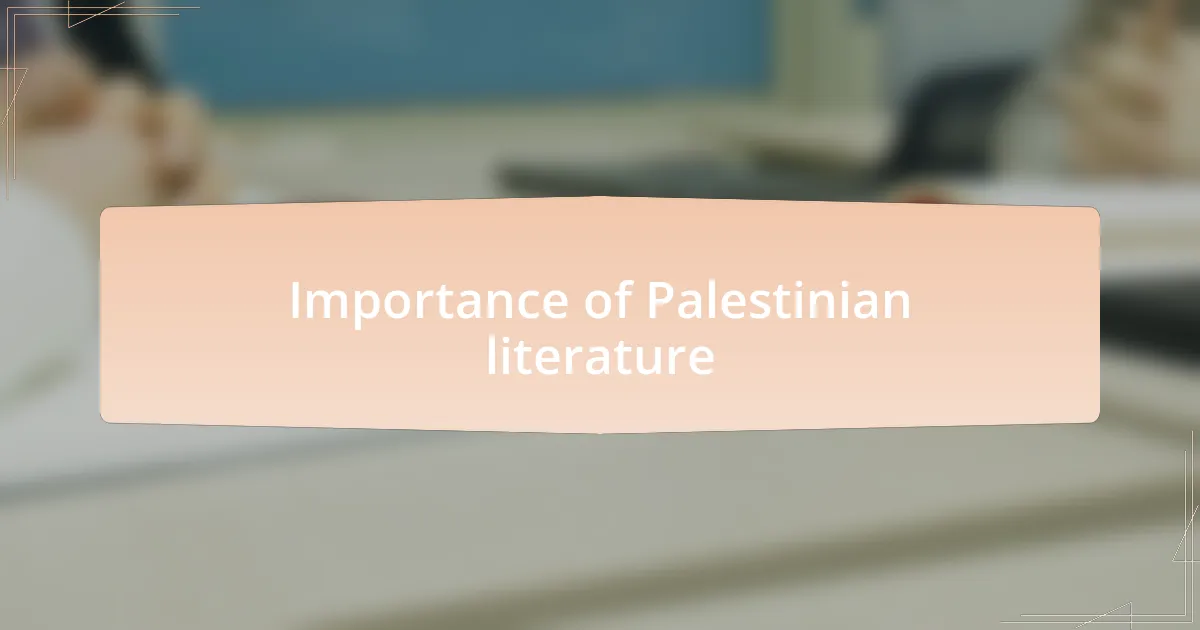
Importance of Palestinian literature
Palestinian literature holds profound significance as it illuminates the complexities of identity and resistance in the face of adversity. I recall attending a poetry reading where the rhythm of the verses encapsulated the pain and hope of a people striving for recognition. Isn’t it remarkable how a few carefully chosen words can spark empathy and understanding in a room full of strangers?
The works I encountered often served as a crucial record of Palestinian life, documenting not just historical events but also the intimate emotions woven into the fabric of everyday existence. I was particularly moved by a novel that portrayed a family’s struggle during displacement; it made me reflect on how stories can preserve collective memory. How many personal histories have been lost to time, only to be recovered through the telling of stories?
Moreover, reading Palestinian literature is an act of solidarity. It invites global audiences to engage with the narrative of a culture that is frequently silenced. I think about the conversations sparked by these texts and wonder: how can we continue to amplify these voices? By immersing ourselves in this literature, we not only learn about the Palestinian experience but also become advocates for broader human rights and dignity.
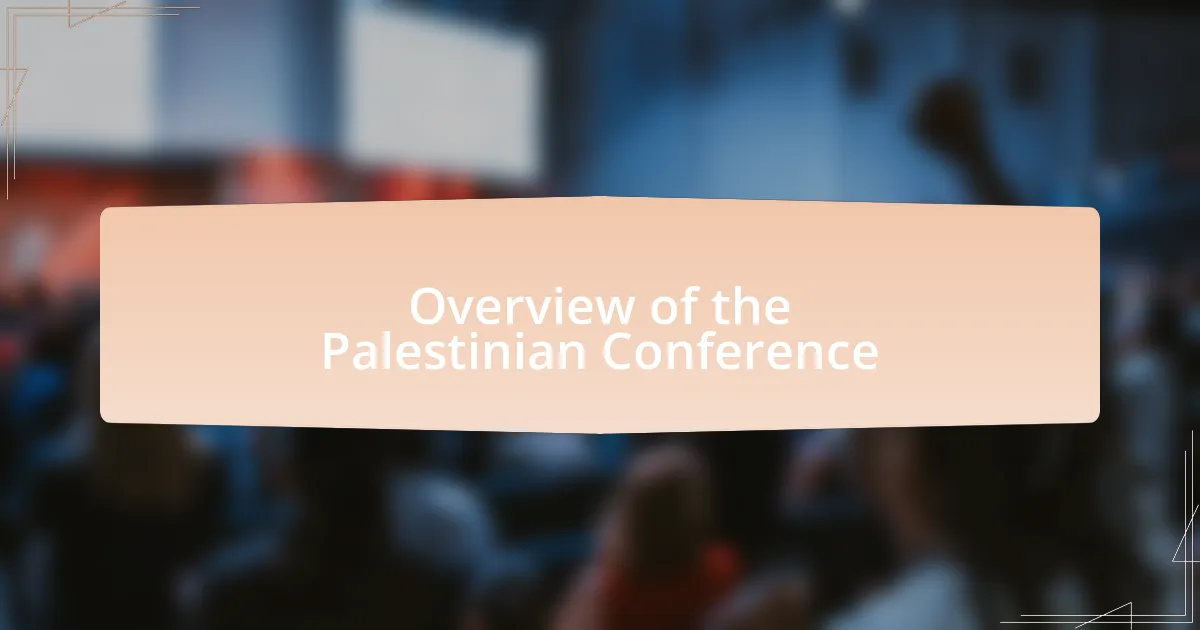
Overview of the Palestinian Conference
The Palestinian Conference serves as a powerful platform for dialogue and exchange among scholars, writers, and activists committed to exploring and promoting Palestinian culture. I remember the energy in the room during a panel discussion; the passion for preserving and sharing Palestinian narratives was palpable. It’s a unique space where voices that might otherwise go unheard find resonance.
At the conference, I encountered a diverse range of perspectives on the role of literature in shaping national identity. One presenter shared how their childhood experiences of reading Palestinian poetry sparked an enduring connection to their heritage. Isn’t it fascinating how literature can become a bridge between generations, fostering a sense of belonging and identity?
The event doesn’t just celebrate artistic achievements; it actively engages with the broader socio-political context of Palestine. I found myself reflecting on the connections made during informal discussions over coffee breaks. These moments of connection are reminders that storytelling is not just an art form; it’s a vital act of community building. What stories will spark the next wave of awareness and advocacy?
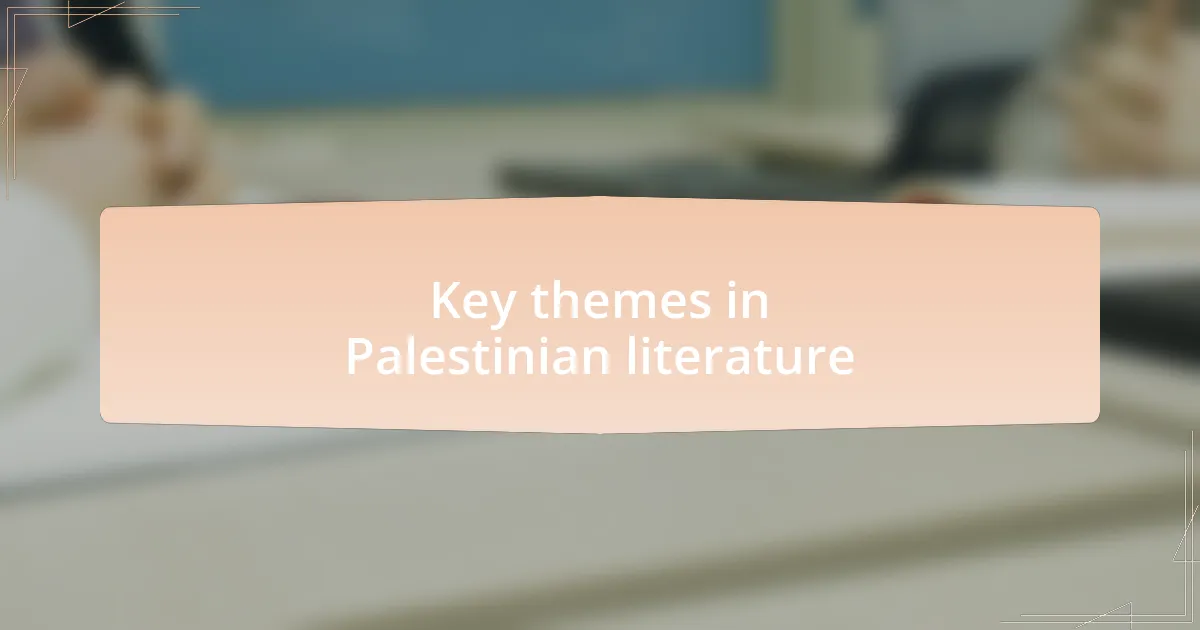
Key themes in Palestinian literature
The themes of loss and displacement permeate Palestinian literature, reflecting the profound impact of the ongoing conflict on individual lives and collective identities. During my readings, I often find myself moved by descriptions of the longing for home and the pain of separation. There’s something deeply resonant about these narratives, which evoke both sorrow and resilience, reminding us how literature captures the human experience in times of turmoil.
Another significant theme is resistance, which manifests itself in various forms—from poetry to prose. I remember being struck by a powerful novel that used metaphor to illustrate the struggle against oppression. It made me ponder: how does storytelling become an act of defiance? The resilience of characters often serves as a beacon of hope, encouraging readers to confront their own realities with courage.
Lastly, the theme of identity is intricately woven into the fabric of Palestinian literature. Authors explore the complexities of belonging and the search for self within a fractured socio-political landscape. I often reflect on how these narratives challenge us to question our definitions of identity. What does it mean to be Palestinian, or to connect with a culture marked by both beauty and pain? These stories compel us to acknowledge the richness of diversity within the Palestinian experience, revealing layers of history, culture, and imagination.
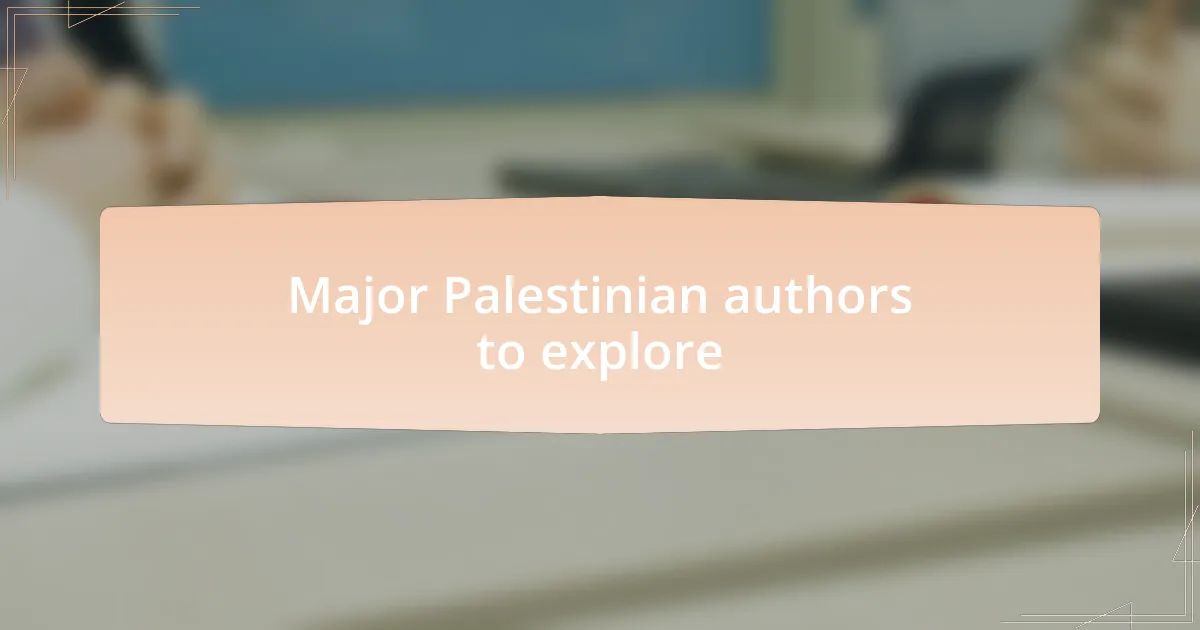
Major Palestinian authors to explore
When diving into Palestinian literature, a few key authors stand out due to their poignant narratives and unique perspectives. Mahmoud Darwish, for instance, is often regarded as the voice of a nation. His poetry captures the essence of longing and exile, weaving personal experiences with broader themes of national identity. I’ll never forget the first time I read his poem “Identity Card.” It raised so many questions for me about belonging and the struggles of self-definition amidst loss. How can words encapsulate such depth of feeling?
Another prominent figure is Ghassan Kanafani, who masterfully merged fiction with political commentary. His stories, particularly “Men in the Sun,” struck me with their unflinching portrayal of the hardships faced by Palestinian refugees. Reflecting on his work, I find myself in awe of how fiction can serve as both a witness and a vessel for historical truths. Have you ever encountered a book that shifted your understanding of reality? Kanafani’s narratives did just that for me.
Lastly, I cannot overlook the contributions of Susan Abulhawa. Her novel “Mornings in Jenin” had a profound emotional impact on me. Through her use of rich, personal storytelling, she highlights the effects of the Israeli-Palestinian conflict on family and community. It made me think about the human cost of political strife. Engaging with her work reminds us that literature is not just about the past; it’s a mirror reflecting our present struggles and a beacon for future hope.
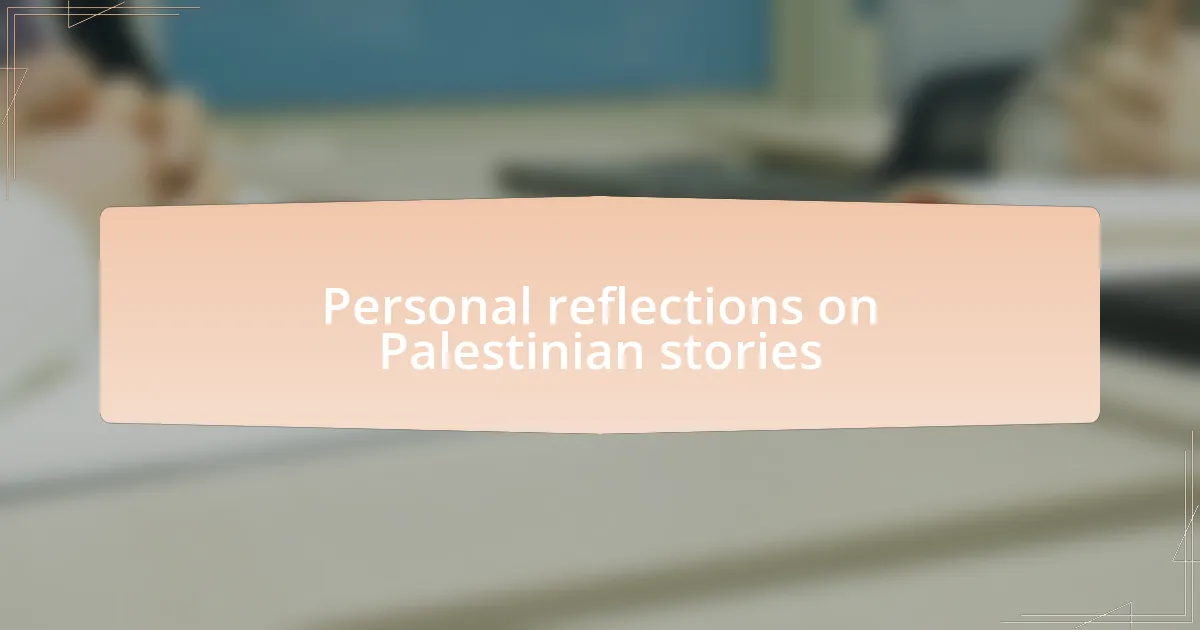
Personal reflections on Palestinian stories
As I delved deeper into Palestinian stories, I found each narrative resonating with my own experiences of identity and displacement. One evening, while reading a collection of short stories by Palestinian authors, I felt an overwhelming wave of connection. It was as if the words were whispering to me, illuminating the shared human emotions of loss and resilience that transcended geographical boundaries. Have you ever encountered a piece of writing that felt like a conversation with your innermost thoughts?
Exploring the tales of everyday life in Palestine transported me to a world where joy and sorrow coexist in vibrant hues. I remember a particularly vivid portrayal of a simple family meal, filled with laughter amidst the backdrop of tension. It made me reflect on how ordinary moments are often intertwined with extraordinary circumstances. Isn’t it fascinating how our daily lives are nourished by both love and struggle, a theme that echoes throughout Palestinian literature?
The stories I encountered often felt like gentle reminders of our shared humanity, prompting me to confront my own understandings of suffering. After reading about the experiences of a character losing their home, I found myself questioning what home truly means. That experience sparked rich dialogues with friends, urging us to reflect on our own definitions of belonging. How do we navigate the complexities of home in a world that’s ever-changing? Engaging with these narratives not only deepened my appreciation for Palestinian literature but also enriched my perspective on universal themes of hope and belonging.
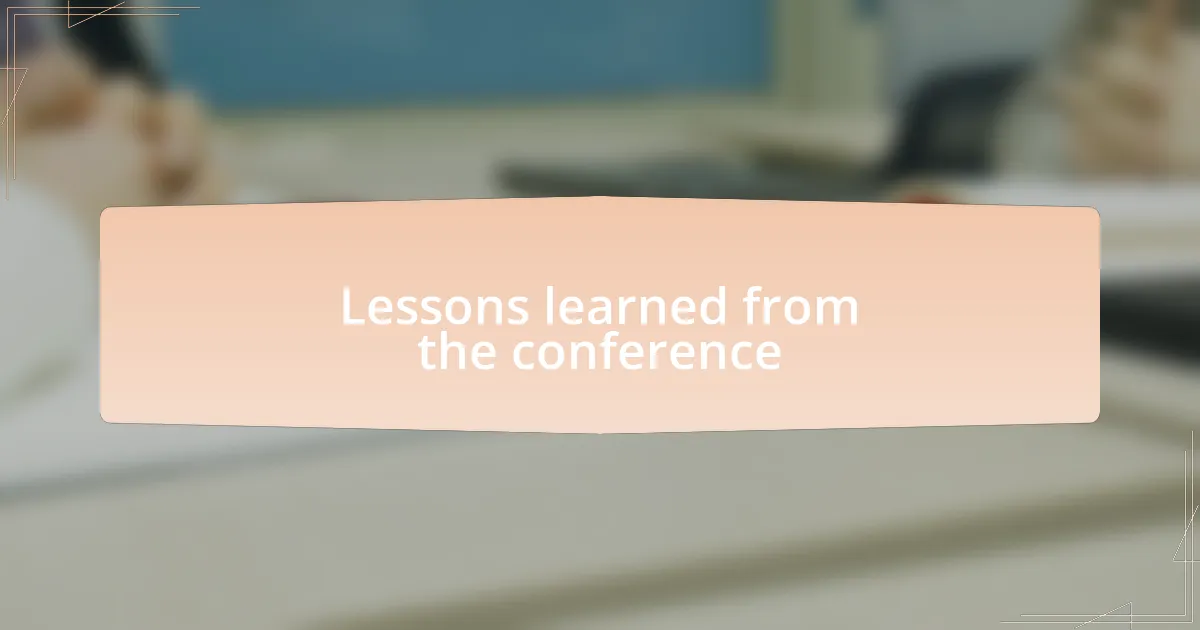
Lessons learned from the conference
Throughout the conference, I learned the significance of storytelling as a tool for healing and understanding. Listening to passionate discussions about the power of Palestinian literature made me realize how these narratives serve not just to document history but also to foster empathy among diverse audiences. I wondered, how can such stories change the way we perceive conflict?
One moment that struck me was a panel where an author shared their journey of writing through trauma. It reminded me of how powerful vulnerability can be in connecting with others. I found myself reflecting on my own experiences and how sharing my voice could resonate deeply with someone else. It sparked the question: What stories lie within us, waiting to be told?
Moreover, the emphasis on preserving cultural heritage resonated strongly throughout the event. I realized that literature is a means of resistance, a way to affirm identity and existence. This insight made me think about the importance of supporting and uplifting marginalized voices in all forms of art. How can we cultivate spaces that embrace these narratives and ensure they thrive for future generations?